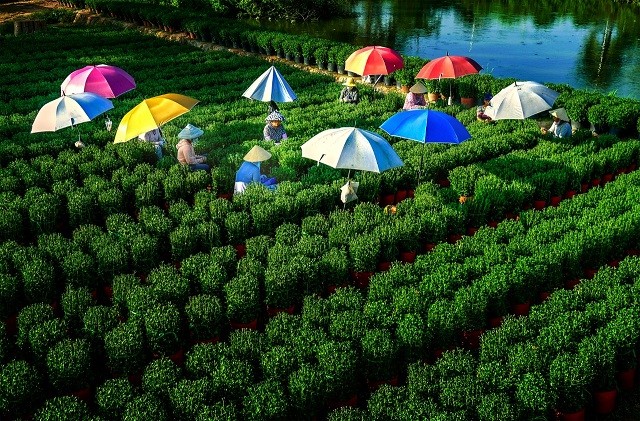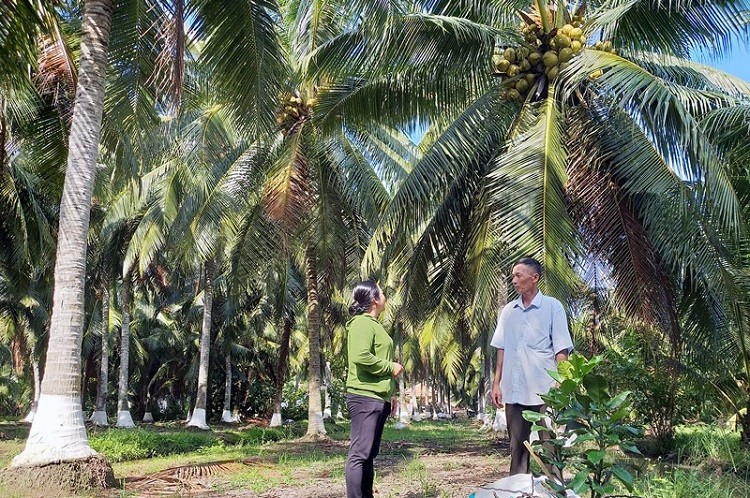
Ben Tre province to work towards sustainable agriculture
Latest
 |
| A new day in Ben Tre province. (Photo: Dang Nhat Linh) |
With its coastline of 65km, it is one of the delta provinces hardest hit by saltwater intrusion up rivers in recent years.
In 2019-2020, the intrusion had a severe impact on people’s lives, farming and agricultural companies, said Huynh Quang Duc, Deputy Director of the province’s Department of Agriculture and Rural Development.
Some 5,400ha of rice were damaged and 168ha of vegetables and 27,900ha of fruits were partly damaged during that dry season, and the losses were worth 1.6 trillion VND (69 million USD), he said.
After this, the department developed various farming models to adapt to saltwater intrusion and effectively restructured agriculture.
In 2021, the province has expanded these models, which included growing green skin and pink flesh grapefruit in Chau Thanh district, reviving saltwater-affected rambutan orchards in Cho Lach district, and growing saltwater resistant rice varieties in coastal areas.
Other models like breeding all-male giant river prawns adapted to climate change and raising cows and goats offer high incomes to farmers affected by the saltwater.
Nguyen Thanh Long, who lives in Thanh Phu district’s My Hung commune, said he used to grow rice until the saltwater intrusion in 2020 severely damaged his crop.
After that district authorities gave him three pregnant cows and calves each and taught him breeding techniques.
He now has 18 cows which produce 70 kilogrammes of milk a day, and he earns an income of 200 million VND (8,600 USD) a year, five times what he got from growing rice, he said.
The provincial People’s Committee plans to modernise agriculture, adopt clean and organic standards and adapt to climate change.
Organic farming
Ben Tre, the country’s largest coconut-producing province, plans to develop more organic coconut farming as the tree is resistant to saltwater and adaptive to climate change.
Duc, deputy director of the department, said the province has identified coconut as one of the key items in its agricultural restructuring programme and developed organic standards to meet the requirements of domestic and export markets.
The province has 14,000ha of organic coconut groves linked with companies that process or sell the products at home and abroad, he said.
Thoi Thanh Agriculture Cooperative in Thanh Phu district’s Thoi Thanh commune has 120ha under organic coconut and sells 100,000 nuts to the local Luong Quoi Coconut Co. Ltd to produce jam for exporting to the US.
Tran Quoc Ung, chairman of the co-operative, said members sell their coconuts at 1,000 VND higher than market rates.
Nguyen Van Dien, a coconut farmer in Thoi Thanh, said: “Organic coconut farming has high production efficiency.”
 |
| Ben Tre is the country’s largest coconut-producing province. |
The province also aims to develop brackish water shrimp farming in coastal areas under value chains to increase farmers’ incomes.
It plans to have 36,850ha of ponds for raising the shrimp by 2025.
They will include 4,000ha of hi-tech farming in the three coastal districts of Binh Dai, Ba Tri and Thanh Phu.
Half of which will adopt Vietnamese and global good agricultural practices (VietGAP and Global GAP), organic and other international standards.
Nguyen Thanh Phong, who has a 2ha farm in Thanh Phu district’s Thanh Hai commune, said he gets three shrimp crops annually and earns 1.5 billion VND (65,000 USD) from each.
The use of technology offers very high incomes since the survival rate of the shrimp is up to 95 percent, he said.
Dao Cong Thuong, Chairman of the Thanh Phu People’s Committee, said the district is focusing on developing hi-tech shrimp farming on a total area of 800ha.
“The model is effective and offers high quality, and shrimp can be exported to the US, Japan and the EU.”
The yield is 40 tonnes per hectare annually, 3.5 times that of intensive farming, he said.
The department has acted as a link between farmers and companies for developing value chains for shrimp production in the three coastal districts of Binh Dai, Ba Tri and Thanh Phu.
They have a total of 2,000ha under the hi-tech shrimp farming model.





















